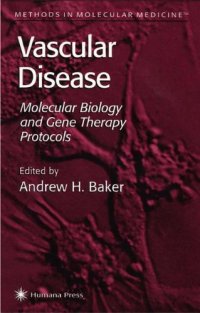
Ebook: Vascular Disease: Molecular Biology and Gene Therapy Protocols
- Tags: Vascular Surgery
- Series: Methods in Molecular Medicine 30
- Year: 1999
- Publisher: Humana Press
- Edition: 1
- Language: English
- pdf
In Vascular Disease: Molecular Biology and Gene Therapy Protocols, Andrew Baker and a noted panel of expert investigators describe today's most powerful molecular methods for investigating the pathogenesis of vascular disease. These detailed, easy-to-follow techniques range from methods that have been used successfully to identify specific mutations involved in cardiovascular disorders, to those for transferring genes associated with cardiovascular disease into various vascular cell types by in vitro and in vivo routes. There are methods to identify novel genes and generate full-length cDNAs, to study gene transcription and promoter activity easily and effectively, and to ascertain precisely gene expression levels within the individual cell types in different pathophysiological conditions. Accurate methods to quantify apoptosis in both cultured cells and pathological specimens are also given. Vascular Disease: Molecular Biology and Gene Therapy Protocols offers today's vascular biologist and gene therapist an unprecedented ability to study the pathogenesis of vascular disease and readily to probe the potential for gene-based therapies. Powerful and productive, the techniques presented here operate across a wide range of exciting research areas, and promise spectacular therapeutic breakthroughs in the ongoing battle against vascular disease.
Molecular biology has revolutionized research into vascular disease. Over the past 20 years molecular techniques have enabled us to both elucidate - lecular mechanisms in vascular disease and identify appropriate therapies. The vast explosion in technical knowledge and the array of protocols that become more advanced and intricate by the day lead us into new and exciting areas of research that were previously unobtainable. Vascular Disease: Molecular Biology and Gene Transfer Protocols - scribes today’s most powerful molecular methods for the investigation of the pathogenesis of vascular disease. The protocols are highly detailed, allowing beginners who have little experience in either vascular biology or molecular biology to embark on new molecular projects. This book is also suited to more experienced molecular biologists who wish to grasp new methods for stu- ing the involvement of genes in normal vascular physiology and in diseased states. It is well established that cardiovascular disease progression has a s- stantial genetic influence. Part I describes three methods that have been used successfully to identify specific mutations in candidate genes involved in c- diovascular disorders. These mutations include both single-stranded conf- mational polymorphism analysis and heteroduplex detection methods. In addition, technology to map new genes to specific regions of chromosomes by high-resolution mapping is described.
Content: